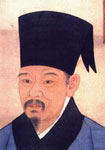“翩然獨往不攜孥”的意思及全詩出處和翻譯賞析
“翩然獨往不攜孥”全詩
輕舟沿泝窮遠近,肩輿上下更傳呼。
翩然獨往不攜孥,兼擅魚鳥兩所娛。
困依巖石坐巉絕,行牽翠蔓隨纏紆。
道逢懃思訪其廬,誦詩清切秋蟬孤。
隱居羞踏陌上土,何人起愛輪下蒲。
水南巷中羅百夫,雞鳴朝謁至日晡。
人生變化安可料,憐汝久遁終無圖。
鳧鷖不足鶴有余,一俯一仰戚與蘧。
嗟我久欲從逃逋,方圓不敢左右摹。
分類:
作者簡介(蘇轍)

蘇轍(1039—1112年),字子由,漢族,眉州眉山(今屬四川)人。嘉祐二年(1057)與其兄蘇軾同登進士科。神宗朝,為制置三司條例司屬官。因反對王安石變法,出為河南推官。哲宗時,召為秘書省校書郎。元祐元年為右司諫,歷官御史中丞、尚書右丞、門下侍郎因事忤哲宗及元豐諸臣,出知汝州,貶筠州、再謫雷州安置,移循州。徽宗立,徙永州、岳州復太中大夫,又降居許州,致仕。自號潁濱遺老。卒,謚文定。唐宋八大家之一,與父洵、兄軾齊名,合稱三蘇。
《次韻子瞻游孤山訪惠懃惠思》蘇轍 翻譯、賞析和詩意
《次韻子瞻游孤山訪惠懃惠思》是宋代蘇轍創作的一首詩詞。以下是該詩的中文譯文、詩意和賞析:
鳥依山,魚依湖,
But all things exist and yet do not exist.
Birds dwell on mountains, fish reside in lakes,
Yet everything is both present and absent.
輕舟沿泝窮遠近,
A light boat travels along the winding river,
Exploring the vastness of distance.
肩輿上下更傳呼。
Carriages passing by call out to each other.
翩然獨往不攜孥,
Gracefully and alone, I go without my children,
Enjoying the company of birds and fish.
兼擅魚鳥兩所娛。
I indulge in the pleasures of both birds and fish.
困依巖石坐巉絕,
I find myself trapped, sitting on a rugged cliff,
Surrounded by entangled vines.
行牽翠蔓隨纏紆。
As I walk, I am entwined by the emerald vines that follow.
道逢懃思訪其廬,
Along the way, I encounter the hermitage of Huiqin,
And visit him, lost in contemplation.
誦詩清切秋蟬孤。
Reciting poetry, his voice is clear and distinct, like the lonely autumn cicada.
隱居羞踏陌上土,
Hidden away, he avoids stepping on the common path,
Shunning the mundane affairs of the world.
何人起愛輪下蒲。
Who will rise to appreciate the humble reeds beneath the wheel?
水南巷中羅百夫,
In the lanes of Shuinan, there are numerous attendants,
And the crowing of the rooster greets the morning until dusk.
雞鳴朝謁至日晡。
From dawn till dusk, they pay their respects.
人生變化安可料,
The changes in life are unpredictable,
No one can foresee what lies ahead.
憐汝久遁終無圖。
I pity you, who have long sought seclusion but remain without a plan.
鳧鷖不足鶴有余,
While there may be a scarcity of mandarin ducks and egrets,
There is an abundance of ducks and quails.
一俯一仰戚與蘧。
One bows, the other raises its head, the sorrows and joys of life.
嗟我久欲從逃逋,
Alas, I have long desired to escape and flee,
But hesitate to move in any direction.
方圓不敢左右摹。
I dare not imitate or conform to the norms of the world.
這首詩詞以自然景物、游覽和思考為主題,描繪了作者在孤山游玩時的所見所感。詩中通過描述鳥、魚、船、山、湖等元素,表達了一種超越現實的境界,以及人與自然的和諧共生。同時,詩人通過表現自己與人世的疏離和對隱士生活的向往,展現了對自由與追求內心平靜的渴望。整首詩以平淡自然的語言,通過對景物的描寫和對內心的思考,傳達了一種超脫塵世的意境,表達了對人生變幻無常和追求內心自由的思考。
“翩然獨往不攜孥”全詩拼音讀音對照參考
cì yùn zi zhān yóu gū shān fǎng huì qín huì sī
次韻子瞻游孤山訪惠懃惠思
niǎo yī shān, yú yī hú, dàn yǒu suǒ yǒu wú suǒ wú.
鳥依山,魚依湖,但有所有無所無。
qīng zhōu yán sù qióng yuǎn jìn, jiān yú shàng xià gèng chuán hū.
輕舟沿泝窮遠近,肩輿上下更傳呼。
piān rán dú wǎng bù xié nú, jiān shàn yú niǎo liǎng suǒ yú.
翩然獨往不攜孥,兼擅魚鳥兩所娛。
kùn yī yán shí zuò chán jué, xíng qiān cuì màn suí chán yū.
困依巖石坐巉絕,行牽翠蔓隨纏紆。
dào féng qín sī fǎng qí lú, sòng shī qīng qiē qiū chán gū.
道逢懃思訪其廬,誦詩清切秋蟬孤。
yǐn jū xiū tà mò shàng tǔ, hé rén qǐ ài lún xià pú.
隱居羞踏陌上土,何人起愛輪下蒲。
shuǐ nán xiàng zhōng luó bǎi fū, jī míng cháo yè zhì rì bū.
水南巷中羅百夫,雞鳴朝謁至日晡。
rén shēng biàn huà ān kě liào, lián rǔ jiǔ dùn zhōng wú tú.
人生變化安可料,憐汝久遁終無圖。
fú yī bù zú hè yǒu yú, yī fǔ yī yǎng qī yǔ qú.
鳧鷖不足鶴有余,一俯一仰戚與蘧。
jiē wǒ jiǔ yù cóng táo bū, fāng yuán bù gǎn zuǒ yòu mó.
嗟我久欲從逃逋,方圓不敢左右摹。
“翩然獨往不攜孥”平仄韻腳
平仄:平平平仄仄平平
韻腳:(平韻) 上平七虞 (仄韻) 上聲七麌 * 平仄拼音來自網絡,僅供參考;詩句韻腳有多個的時候,對比全詩即可判斷。